Follow our live blog for the latest updates
Summary of latest updates:
ADVERTISEMENT
ADVERTISEMENT
Calls grow for UK PM to sack his chief adviser for alleged breach of lockdown rules
German economy sinks into 'technical recession' after shrinking by over 2% in first quarter
Spaniards can hit the beach and drink on the terrace as lockdown eases
Greece resumes ferry services to islands in bid to boost tourism; Czech bars resume full service
Immunity to coronaviruses may only last just six months, says new study
Protesters take to the streets of Berlin over government's lockdown response
White House announces a ban on travel to the US from Brazil due to the spread of coronavirus
Russia reports highest daily death toll since the beginning of the pandemic
Follow all our updates below:

 ${title}
${title}
Live ended
'Significant milestone' as Ireland sees first day without COVID-19 death
France records 90 more deaths in hospitals
50 more deaths in Spain
Outdoor markets and car showrooms to open from 1 June in UK
Germany approves €9bn euro aid package for Lufthansa
The German government has approved a 9 billion euro aid package for stricken airline Lufthansa to keep a major employer going through the coronavirus pandemic.
Economy Minister Peter Altmaier said the aid package is a “sustainable and reasonable” solution to keep the company going. “We have also ensured that over 100,000 people need not live in fear of imminent loss of their jobs," he said at a briefing in Berlin.
He added that the government was in talks with the European Commission over its approval for the deal but declined to say what was at issue.
Lufthansa CEO Carsten Spohr told employees on April 24 that the company was losing cash at the rate of a million euros per hour and that passenger numbers had fallen to 1 percent of previous levels.
Immunity to coronaviruses may only last just six months, says new study
Researchers at the University of Amsterdam found that there was an "alarmingly short duration of protective immunity to coronaviruses". Read more:
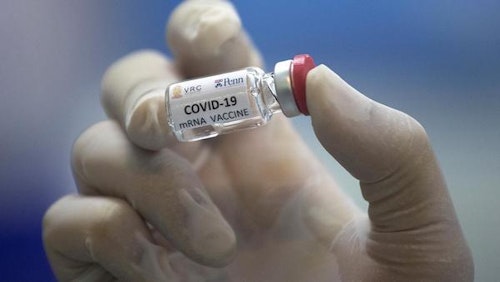
Immunity to coronaviruses may only last just six months, says study
euronews It casts doubt over the practicality of introducing "immunity passports", which some governments want to issue to COVID-19 survivors.UN trial for virus therapies pauses testing on Trump's drug
The World Health Organization says it will temporarily drop hydroxychloroquine — the malaria drug President Trump says he is taking — from its global study into experimental COVID-19 treatments, saying that its experts need to review all available evidence to date.
WHO director-general Tedros Adhanom Ghebreyesus said that in light of a paper published in the Lancet that showed people taking hydroxychloroquine were at higher risk of death and heart problems, there would be “a temporary pause” on the hydroxychloroquine arm of its global clinical trial.
Dr Michael Ryan, WHO's emergencies chief, said there was no indication of any safety problems with hydroxychloroquine in the WHO trial to date, but that statisticians would now analyse the information.
Last week, Trump announced he was taking hydroxychloroquine although he has not tested positive for COVID-19. His own administration has warned the drug can have deadly side effects, and both the European Medicines Agency and the US Food and Drug Administration warned health professionals last month that the drug should not be used to treat COVID-19 outside of hospital or research settings due to numerous serious side effects that in some cases can be fatal.
Watch Euronews Tonight for latest updates...
For the latest on the Dominic Cummings saga and other stories watch here for updates on Euronews TV throughout the evening:
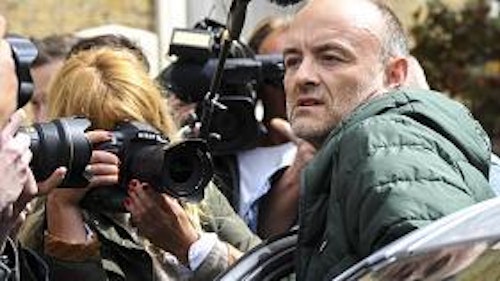
Watch euronews TV Live - Television live broadcast | Euronews
euronews Follow the news live on euronews.com – Breaking news, latest news updates, international news, stay informedRussia remains in lockdown as COVID-19 cases top 350,000
Russia President Vladamir Putin has delegated the responsibility of easing lockdown measures to regional governors.
The number infections is of one of the highest in the world, and Moscow is at the centre of the country's outbreak.
Our Moscow correspondent Galina Polonskaya reports:
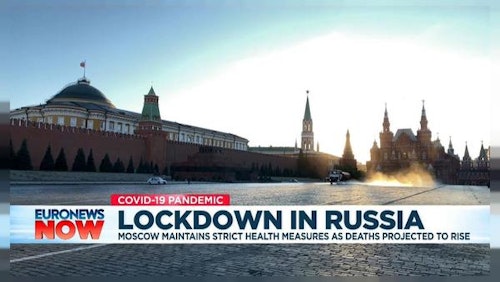
Coronavirus: Russia remains in lockdown as cases top 350,000
euronews Russia's deaths-to-infections ratio is far lower than in other countries. Doctors and activists say the number of fatalities is much higher.Cummings 'eyesight' claim ridiculed on social media
The explanation by Boris Johnson's adviser for his 30-mile trip to Barnard Castle on April 12 (Easter Sunday) has... raised eyebrows on social media and elsewhere.
Dominic Cummings said he wanted to test his recovery, especially his eyesight which had suffered while he had COVID-19, before making the longer drive back to London.
"If I’m worried about my vision, driving a car containing my family for 30 miles is a bold choice of eye test," said one comment on Twitter.
"Oh come on now, who hasn’t gone for a drive to check their eyesight?" asked Scottish National Party (SNP) MP Alyn Smith, with not a little hint of irony.
Cummings on the 'exceptional circumstances' regarding his child
Dominic Cummings' justification for his family's 400-kilometre trip from London to Durham is central to his account. The PM's top aide says there were "exceptional circumstances" and it was a "complicated, tricky situation".
He says had it been impossible for him or his wife to care for their 4-year-old due to their illness, there were other family members available on the farm property in Durham, whereas in London they would have had to call on the emergency services.
These are the UK government guidelines for households experiencing COVID-19 symptoms at the time of his trip.
They repeatedly stress the importance of staying at home for at least 7 or 14 days -- depending on how the symptoms develop -- and list several recommendations for particular circumstances. There is a whole section on "Why staying at home is very important".
The guidance adds that for those living with children "we are aware that not all these measures will be possible".
This is the relevant legislation for England covering coronavirus restrictions. "During the emergency period, no person may leave the place where they are living without reasonable excuse," it says.
It lists over a dozen circumstances which a reasonable excuse would "include", which implies the list is not exhaustive.
Cummings says 'I behaved reasonably and legally' and will not resign
The PM's special adviser apologises for not making his statement earlier, before giving a long account of how his family became ill and travelled from London to Durham.
Dominic Cummings describes how his wife rang him on March 27 to say she was ill and was worried about who would care for their boy, aged 4. The made the decision to travel north.
They travelled in late March and remained on a separate property on the family farm until April 13, when Dominic Cummings considered he was well enough to return to London for work. They self-isolated and only had "shouting" contact with other members of the family.
The journey north was due to particular circumstances and for his family's welfare, given that his home in London was a "target", he says.
In the circumstances I behaved "reasonably and legally", he says, but accepts that "reasonable people may disagree". The legal rules do not cover all situations, including his own, he adds.
Cummings acknowledges the "hardship and sacrifice" suffered by many British people.
He confirms a reported journey in Durham of around 30 miles to Barnard Castle on April 12, saying it was to test his eyesight and health to see if he was fit enough to make the longer return journey to London.
Other reports suggesting he returned to Durham and was seen there on April 19 are false, Cummings says.
He later says the family did not stop to fill up with petrol on the outward journey, but may have done on the return. Questions have been asked as to whether they may have come into contact with others while infected with COVID-19.
Boris Johnson's aide takes questions from reporters. He is asked whether he should resign or had offered to -- he says no -- and whether he owes an apology to many "ordinary families" who could not, or did not, take similar action.
UK: Cummings makes statement amid lockdown furore
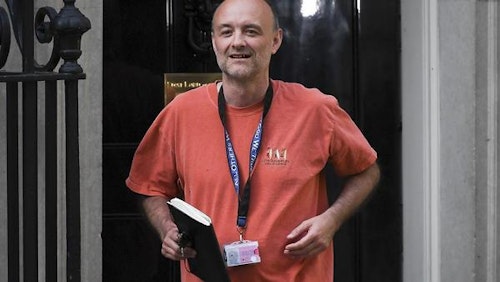
Who is Dominic Cummings and why do so many people want him sacked?
euronews UK Prime Minister Boris Johnson's closest ally is accused of breaking the government's own rules during the coronavirus lockdown to arrange childcare for his four-year-old son.Indoor pools and gyms open in Italy
Italians have been allowed back into indoor swimming pools and gyms on Monday as the government continues to lift restrictions as part of its phase 2 handling of the coronavirus.
Over the past few weeks stores, museums, coffee bars, restaurants, and shopping centres have opened their doors. The faithful can now attend religious celebrations.
The past weekend was the first time that Italians were allowed to swim and sunbathe at the beach. But reports said strict social distancing rules were not always respected as many turned out to enjoy the sunshine.
Italy went into lockdown on March 11. So far over 32,000 people have died as a result of Covid 19 and over 229,000 have been infected according to the official count.
But in the past few weeks the numbers of new infections and deaths have been dropping steadily, so the government has begun allowing a return to normality.
Financing a recovery: EU 'frugal four' at odds with Brussels over €500 billion rescue
Netherlands reports second suspected mink-to-human infection
Agriculture Minister Carola Schouten revealed in a letter to parliament that three people have contracted the disease at a mink farm and that "at least one of the three infected persons was infected by a mink".
"All possible measures are under consideration," she added.
Schouten announced a first "likely" mink-to-human infection last week. READ THE FULL STORY HERE.
COVID-19's 'soft landfall' in Africa
Latest figures from the World Health Organization say there have been 110,900 confirmed cases in Africa, with over 44,500 recoveries and 3,300 deaths. This on a continent with a population of over 1.3 billion, according to UN estimates.
The WHO's regional director for Africa said on Friday the disease had so far made a "soft landfall" with lower numbers of deaths than in some other parts of the world, but warned against complacency.
Durham police asked to investigate Dominic Cummings visit
The acting Police and Crime Commissioner for Durham is asking the chief constable to investigate the visit to the county by Boris Johnson's top aide, in alleged breach of lockdown regulations.
Dominic Cummings made the 400-kilometre trip from London in late March with his wife, who was displaying COVID-19 symptoms, to arrange child care.
There's been an avalanche of criticism and calls for Cummings to be sacked, amid accusations that the move undermines the UK government's lockdown strategy, but the prime minister is standing by his adviser.
Czech coal mine stops work after COVID-19 outbreak
It's not all good news from the Czech Republic: a coal mine in the northeast near the border with Poland has halted work after a major COVID-19 outbreak among the miners, AP reports.
In recent days, tests of some 2,400 people revealed a total of 212 positive for coronavirus, mostly miners from the Darkov mine in the town of Karvina and their family members. It’s currently the biggest local outbreak in the country.
The head of the regional government says only workers who are necessary to deal with ventilation and water pumping remain in the mine.
Local health authorities have limited public gatherings in Karvina county to 100, while it is 300 in the rest of the country. Visits to nursing homes and hospitals are banned
The daily increase of confirmed COVID-19 cases in the entire Czech Republic was 65 on Sunday. A total of 8,957 people have tested positive in the country, while 315 have died.
Bars, cafés and pubs resume full service in Czech Republic
Pubs, bars, cafés and restaurants can resume full service in the Czech Republic from today as COVID-19 restrictions are eased. Customers can now be served in interior spaces as well as outdoors.
Hotels, public swimming pools, health centres and saunas are also reopening.
Sporting, cultural and other public events for up to 300 people are once again allowed, up from a limit of 100.
Face masks are obligatory on public transport, in enclosed spaces and inside buildings.
Here's a reminder of how the party continued for some Czechs during the lockdown, at a drive-in festival in Prague a couple of weekends ago:
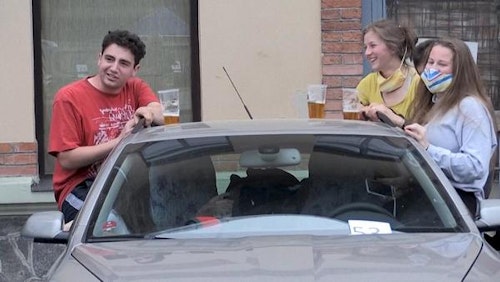
Starved for culture, Czechs hold drive-in festival
euronews A Prague festival producer said the coronavirus pandemic forced him turn his festival into a drive-in event.Protesters take to the streets of Berlin over government's lockdown response
"A very big mix of people": Our report on the latest protests against Germany's coronavirus lockdown this weekend.
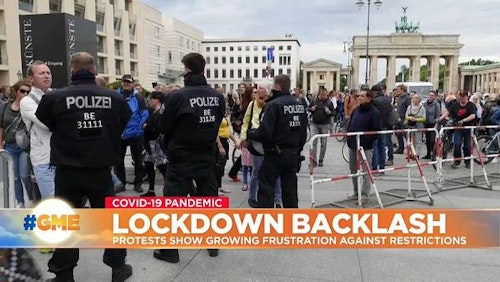
Protests in Berlin over government's lockdown response
Experts say that the demonstrations come from a variety of different political camps united by a shared distrust in the stateJapan lifts state of emergency all over the country
As expected, Japanese Prime Minister Shinzo Abe has lifted a coronavirus state of emergency in Tokyo and four other remaining areas, ending the restrictions nationwide (see earlier blog entry).
The emergency declaration was removed in most of Japan earlier this month.
The PM's announcement now lifts the emergency in Tokyo, neighbouring Kanagawa, Chiba and Saitama prefectures, and in Hokkaido to the north.
Japan has reported around 16,600 confirmed cases and about 850 deaths.
Spain's phased reopening: PM praises 'formidable' response as two-speed de-escalation begins
Germany slips into recession
The German economy shrank by 2.2% in the first quarter of the year compared to the same period in 2019 amid a global downturn linked to the coronavirus pandemic.
Germany's Federal Statistical Office said Monday that it was the biggest quarterly decline since the 2008-2009 global financial crisis.
Figures show that private consumption and exports were the hardest hit. Investments in the engineering sector, construction and public expenditure helped prevent an even bigger downturn.
As Germany's economy dipped 0.1% in the last quarter of 2019, the country has entered what is known as a “technical recession.”
Greece starts holiday season earlier than expected
The country’s low infection rate in the COVID-19 pandemic has prompted the government to start the holiday season earlier than expected, on June 15, as other Mediterranean countries — including Italy, Spain, and Turkey — are grappling with more deadly outbreaks.
Distancing regulations and passenger limits have been imposed on ferries and at restaurants, while state-run health services to combat new coronavirus cases are being expanded to the islands.
Madrid and Barcelona: restrictions slowly lifted for hardest-hit regions
Japan set to end state of emergency in Tokyo
Experts on a special government panel have approved a plan to remove a coronavirus state of emergency from Tokyo and four other remaining prefectures, paving the way for Prime Minister Shinzo Abe to declare entirely ending the measure to allow businesses to gradually resume.
Economy Minister Yasutoshi Nishimura told reporters that experts on a government-commissioned panel approved the plan to end the state of emergency that has lasted for more than a month and a half.
Abe is to officially declare the end of the state of emergency later Monday after endorsement from parliamentary committees.










